- Home
- Tim LaHaye
Luke's Story: By Faith Alone Page 6
Luke's Story: By Faith Alone Read online
Page 6
Theophilus slumped. “I did find that disconcerting. I pray I never come across that way.”
“Only when you try to pass me off as something other than what I am.”
Theophilus stood. “I’m embarrassed,” he said. “Forgive me for this clumsy effort.”
“I assume you meant well.”
“You do wish to marry one day, do you not?”
Luke shrugged. “Perhaps. But I expect my life will be hard, even when I am free. Medicine is no pursuit for someone who covets wealth, and any woman’s father will know that.”
“You will wa“Neither will be bearing any goods, and they carry no cash. If they are accosted, I doubt they’ll be in danger unless they do something foolish. If the new man is not here in due time, then we can worry.”
The time seemed right for Luke to express himself to Theophilus, but knowing the scroll he had written was in his pack somehow caused him to take the easy way out. He didn’t know what had gotten into him, as he had never had trouble communicating with Theophilus, at least not in years. When the master began yawning and mentioning the late hour, Luke asked if he could leave his written message with him.
“Certainly. What is it?”
“Just something I felt more comfortable putting in writing.”
“Not bad news, I hope.”
“Hardly.”
Luke fetched the scroll from his room and gave it to the master before retiring. He had just settled in when he heard a soft knock at his door. It was Theophilus, clearly moved. “Thank you, Luke,” he said, hurrying away.
Luke guessed it was about midnight when he heard voices outside and crept to the window. There stood Theophilus in a billowing dressing gown and with matted hair, speaking urgently to two aides and two slaves. “No word at all?”
“Nothing. We have no idea whether Diabolos made Daphne, was accosted, or has fled.”
“He had no reason to flee. I could have had him flogged for how he treated Luke, but I merely sent him back and told him to send a replacement.”
“Perhaps he feared what was to come,” an aide said.
“He’d better now,” Theophilus said.
“Now, sir, we don’t know that he is being willful. He could be in trouble.”
“We’ll know that soon enough.” The master turned to the slaves. “Get torches and take two of our most rested steeds, and arm yourselves. Cover the route between here and Daphne as fast as is feasible, and send Balasi back with a wagon. He will attend to Luke while we try to locate Diabolos.”
Luke wanted to go with the two slaves, but he was not proficient at riding, and he knew Theophilus would never hear of it. He worried about Diabolos and hoped they would find him neither having been attacked nor trying to escape. But Luke couldn’t imagine another option. The master had shown great trust in Diabolos, especially under the circumstances, allowing him to get himself back to Daphne.
It would be great to have Balasi around. The old slave had been a friend of Luke’s parents and of Lippio. He was
quiet and some thought a bit shy, but he had always been obviously fond of Luke. By dawn he should arrive, along with whatever news there might be about Diabolos.
AS LUKE LAY TRYING to drift off, he couldn’t quit worrying and wondering if he was just too eager to be understood. It niggled at his brain that there were those who thought he was lording his privileges over them and would forget that he too was a slave.
ßšüóght="6">“Let me arrange a wagon or carriage, Luke,” Theophilus said.
“Send one after us,” Luke said. “There’s no time to waste.”
As he leapt onto the horse behind the rider, Luke found himself back of the saddle on the steed’s bare flanks. He reached around the rider and dropped his satchel in the man’s lap, then wrapped his arms around the man’s waist.
As the horse was urged to gallop out the gate and onto the main road, Luke worried he would be pitched off, and he held on as tight as he could.
NOT TEN MINUTES LATER, Luke was kneeling next to Diabolos in a ditch off the side of the road. The wagon was deep in the culvert on its side, and one would have had to be searching for it to see it.
Diabolos’s breathing was shallow. Luke motioned the two slaves closer with their torches and could see that the young man had lost much blood. But was quickly able to determine that the wound, he assumed from a knife, need not be fatal if he acted fast, as it had missed the major vein.
Diabolos looked pale and terrified. He wrapped one of Luke’s wrists in a death grip and rasped, “Bandits. I tried to outrun them, but the wagon was too heavy. They forced me off the road.”
“But why, Diabolos? You had nothing of value to them. You should have just stopped and shown them.”
“I didn’t want to give them the satisfaction. Anyway, you know I’m a fighter.”
“Yes, and look what it’s cost you. Any other injuries?”
“Just scrapes and bruises, I think. Am I going to die?”
“Not if I can stop the bleeding.” Luke rummaged in his satchel for absorbent cloths. He had seen the old physician actually sew up wounds like this, but he had never done it. Needle and thread were among his supplies, but he hoped he wouldn’t have to use them.
No such luck. It seemed the more he tried to pack cloth into the gaping hole, the more bleeding he caused. Trouble was, he had none of the ointment the late physician had said made the stitching of flesh more bearable. “Hear me, Diabolos. I must draw your flesh together and bind it. You must lie as still as possible.”
“You aim to sew my flesh like cloth? No!”
“Or you can lie here and bleed out to your death.”
“How am I to hold still if you pierce me yet more?”
“These men will hold you still.”
The slaves planted their torches in the ground, and each took one of Diabolos’s arms. To keep the injured man from further thrashing about, Luke planted a knee on either side of his chest and bent low for the best view of the wound. The jagged opening was perhaps a bit longer than two inches and extended from the left of Diabolos’s neck to the middle. Luke used a mixture of watetogized that if he let the blood on his fingers dry a bit, it gave him a better grip on the otherwise slippery gash. That allowed him to quickly draw it together and hold it as he forced the needle in. Somehow Diabolos was able to keep from thrashing, though he hissed and whined until Luke had completed six large loops and tied them off.
Luke and the other two slaves were together able to right the wagon, though its rear axle had been damaged and they had to wait until Theophilus sent another to slowly rumble and lurch the whole slow way back to the compound.
OVER THE NEXT SEVERAL DAYS, Luke monitored Diabolos, stationing him in his own bed and having a cot set outside the door for himself. Though it quickly became clear that Diabolos was out of danger, his healing wound turned fiery red and painful, so Luke had to tend to it every few hours.
Theophilus expressed concern every day that Luke’s vacation from school was being spoiled this way, and he sent for Balasi anyway to serve him. Luke felt strange, a slave in effect employing a slave. But the old friend of his family proved most helpful, though Luke was careful to never ask him to do anything he could do for himself.
Balasi seemed older and slower than Luke had remembered. He loved to talk, though, and that was a nice diversion. He privately assured Luke that while, yes, there were those among the slaves who were jealous of Luke, they did not seem to resent him and many, many more were happy for him.
“They look forward to when you come back and become their doctor,” the old man said.
Luke was napping on the cot outside his room one afternoon when he roused enough to be aware that Balasi had delivered his midday meal and was also taking a tray in to Diabolos. When he didn’t return immediately, Luke sat up, aware of an earnest conversation behind the door.
“Your dad and me was friends, you know,” Balasi was saying. “And I owe it to him to speak my mind. Now it looks like
you’re going to be okay in time, and you know you owe it to that boy out there.”
“He’s little more boy than I am, old man. We’re close to the same age, but there’s nothing else the same about us.”
“There could be, except that you’re nasty to him and to everybody else. We all lost somebody, you know, son, Loukon included.”
“But look what he’s got now. He might as well be a freeman already.”
“He deserves it if anybody does, and you know it.”
“Make me the master’s pet and let me sleep in his house and study under his tutors and I’d deserve it too.”
“Aw, go on, Diabolos. You and I wouldn’t know what to do with all that learning. It was obvious Loukon was bright before he could hardly speak.”
“Yeah, but you can tell how much he loves being over everybody else.”
“I don’t see that in him at all. You only see it that way ’cause you’re jealous.”
“You shouldn’t be. He saved your life. And word is he kept you from a flogging too. You ought be to glad the master listens to him.”
“How am I supposed to feel, a slave just like me defending me to the master?”
“How are you supposed to feel? Grateful. Your parents would be ashamed.”
“Don’t be talking about them.”
“Why not? Can’t you remember how good they were? I’ll bet they were proud of Loukon.”
A long pause made Luke wonder what was going on. When Diabolos spoke again, the pain and anger were obvious.
“They were!” he spat. “He was all they could talk about. It was like they wished he was their son and not me!”
Balasi’s tone suddenly changed from scolding to sympathy. “We all go through that, Diabolos. My parents always compared me with my brother and sister. It was wrong and it was hurtful, but they were just trying to make me a better man.”
“It didn’t work.”
Balasi laughed. “I know. But they tried. You want to know what your father used to tell me about you?”
“What?”
“You don’t think he talked about you? He talked about all his children.”
“What did he say?”
“He said you could do anything you put your mind to. Said you were more than just a big, strong boy, but that you had a good mind too.”
“I can’t even read.”
“Neither can I. But you know as well as I do that there is a lot more to being smart than being able to read. We don’t all have to be geniuses like Luke.”
“My father really said that?”
“Why would I lie? He said you being a slave was a waste, that you would make a good freeman.”
“You’d better not be just saying this.”
Balasi’s tone went soft again. “You know I’m not. And you also know you owe Loukon two things.”
“What?”
“Prove to me you have the mind your father thought you had. What two things do you owe Loukon?”
“I don’t know. I guess thanks for saving my life.”
“Of course. And what else?”
“Keeping me from getting punished?”
“Thanks for those two things and then something else.”
“You’re going to have to tell me.”height="6">
“No I’m not. How have you treated Loukon?”
“Pretty bad, I guess.”
“Then besides thanks, what do you owe him?”
“I know.”
“Tell me.”
“An apology. But I have to tell you, Balasi, thanks is going to be a lot easier for me than an apology. I haven’t apologized for years, and only when my father made me apologize to my mother.”
“You need me to make you do this?”
“You can’t.”
“I know, and I wouldn’t want to, because then you wouldn’t mean it. You can thank Loukon for what he’s done for you, because there’s no question about that. But don’t you dare apologize for the way you’ve treated him until you can really mean it.”
BY THE TIME Luke was to be taken back to the harbor for the voyage to Tarsus, Diabolos had been up and about for a few days. He was timid, shy, quiet around Luke, answering only his medical questions. Luke urged him not to do anything strenuous for another couple of weeks and had to refuse when he offered to help load Balasi’s wagon for the ride to the harbor.
Balasi did the work, with Luke’s assistance, then helped Diabolos into the seat so he could ride along. The trip was awkward, because Luke kept expecting Diabolos to say something. Balasi wound up making small talk about the weather, the route, the ship, and the master’s new restrictions against anyone under his charge being out on the road after dark, alone or otherwise.
Finally they unloaded and got Luke’s stuff aboard, and Luke said his goodbyes to the old man. Balasi climbed back onto the wagon, but Diabolos remained with Luke, still silent.
“Well, take care of yourself,” Luke said. “I’ve told the mistresses of the house how to change that bandage, but don’t exert yourself for a while.”
“Yeah, okay. Listen, I wanted to thank you for what you did for me.”
“Don’t mention it.”
“Of course I’m mentioning it. You saved my life, and before that you kept me from getting into too much trouble with the master. You didn’t have to do that.”
“You’re welcome.”
“I mean, I got myself in enough trouble anyway, but you tried to help.”
“Okay, then. Maybe I’ll see you next time I come back.”
“Yeah.”
Diabolos pawed at the ground with his sandal, and Luke was glad there set="6" width="1em">“Isn’t that wonderful,” Luke said, shaking his hand again. “You must be so proud. It’s a privilege to know you.”
“It is, isn’t it?” Saul said, and while he had twinkle in his eye, Luke believed he meant it. “And what a Stoic thing to say.”
This made his mates laugh.
Luke merely nodded and smiled, unable to think of a rejoinder.
“I’ll meet you in the greater courtyard at sunset, then,” Saul said. “How’s that?”
“Perfect,” Luke said, retreating.
Now he had compounded his envy with deceit. What was wrong with him? Throughout the rest of the day, he resolved to be honest with Saul that evening.
SAUL APPEARED DISTRACTED and eager to get on with it that evening when Luke approached. “Do you have another commitment?” Luke said. “Should we do this another time?”
“No, this is fine, but yes, of course, I have other commitments tonight. There are precious few breaks in my day, which I assume is true with you too.”
“It seems I study all the time.”
“I study too, but I also speak, write, engage in athletics. And I love to debate. Is that what we’re going to do now?”
“I hadn’t planned to.”
“Then what?”
“I have just a few questions for you. About Judaism.”
“You have come to the right person, as I assume you know.”
“I knew you would think so.” It was out before Luke could corral it. “I am just trying to be funny, Saul.”
“I know, but in humor resides the truth. Not only am I the right person to ask about the one true God, but yes, I also know I am. In my mind, it is not conceit when it is true. If I thought I were an authority on Judaism and was not, I would be guilty of foolish pride. But I doubt you could raise an issue about my religion about which I am not versed. Try me.”
“I am a Stoic, as you know.”
Saul nodded.
Luke hesitated, not wanting to admit to this man that he had found the philosophy wanting, especially when it came to personal piety.
“But you miss God,” Saul said. “Do you not?”
“You know Stoics believe in logic and reason, that which can be seen and felt and studied.”
“Don’t tell me God cannot be studied, Luke. I have been studying Him and His ways and statutes for as long a
s I can remember. I began studying the Scriptures when—”
“You were five, yes, I’m aware. Deeper stuffical school at thirteen.”
“You have a good memory.”
“You generally don’t let people forget.” Again Luke had allowed his bitterness to come through, and he hated himself for it.

 Glorious Appearing: The End of Days
Glorious Appearing: The End of Days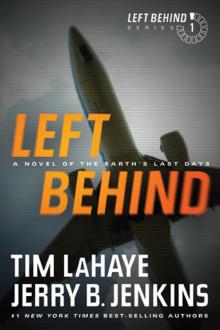 Left Behind: A Novel of the Earth's Last Days
Left Behind: A Novel of the Earth's Last Days Kingdom Come: The Final Victory
Kingdom Come: The Final Victory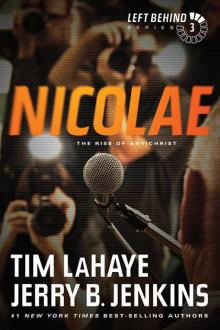 Nicolae: The Rise of Antichrist
Nicolae: The Rise of Antichrist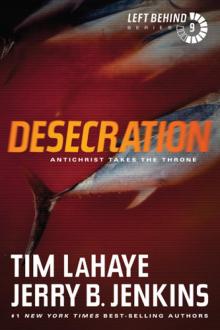 Desecration: Antichrist Takes the Throne
Desecration: Antichrist Takes the Throne Mark's Story: The Gospel According to Peter
Mark's Story: The Gospel According to Peter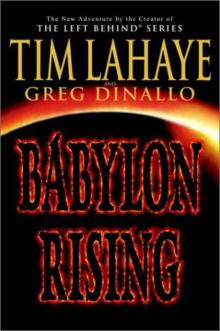 Babylon Rising
Babylon Rising Thunder of Heaven: A Joshua Jordan Novel
Thunder of Heaven: A Joshua Jordan Novel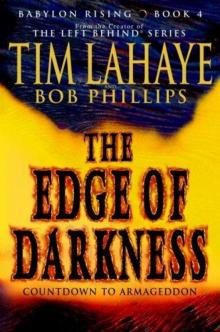 The Edge of Darkness
The Edge of Darkness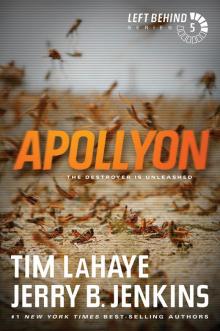 Apollyon: The Destroyer Is Unleashed
Apollyon: The Destroyer Is Unleashed Armageddon: The Cosmic Battle of the Ages
Armageddon: The Cosmic Battle of the Ages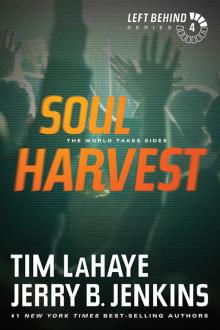 Soul Harvest: The World Takes Sides
Soul Harvest: The World Takes Sides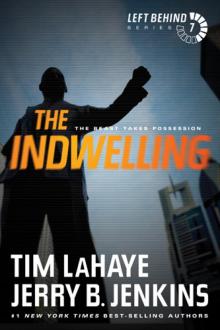 The Indwelling: The Beast Takes Possession
The Indwelling: The Beast Takes Possession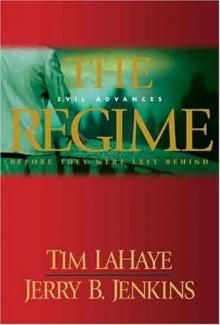 The Regime: Evil Advances
The Regime: Evil Advances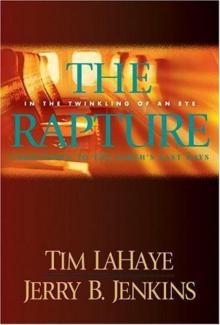 The Rapture: In the Twinkling of an Eye / Countdown to the Earth's Last Days
The Rapture: In the Twinkling of an Eye / Countdown to the Earth's Last Days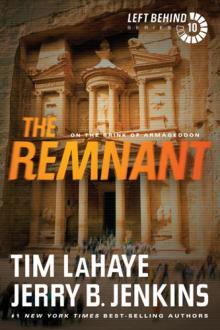 The Remnant: On the Brink of Armageddon
The Remnant: On the Brink of Armageddon John's Story: The Last Eyewitness
John's Story: The Last Eyewitness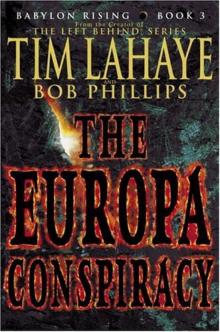 The Europa Conspiracy
The Europa Conspiracy Mark of Evil
Mark of Evil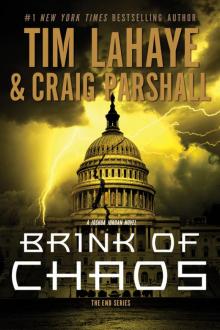 Brink of Chaos
Brink of Chaos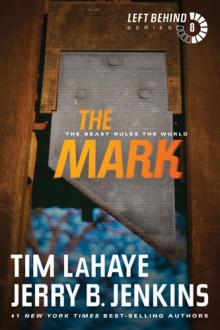 The Mark: The Beast Rules the World
The Mark: The Beast Rules the World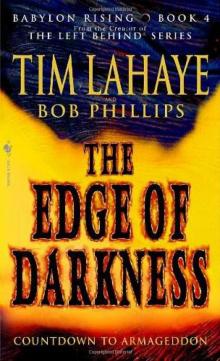 04 The Edge of Darkness
04 The Edge of Darkness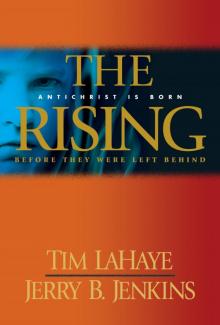 The Rising: Antichrist is Born / Before They Were Left Behind
The Rising: Antichrist is Born / Before They Were Left Behind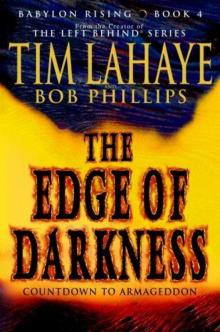 Babylon Rising: The Edge of Darkness
Babylon Rising: The Edge of Darkness 03 The Europa Conspiracy
03 The Europa Conspiracy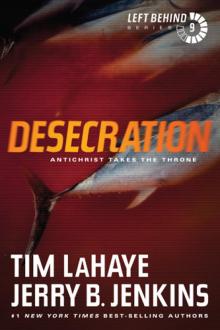 Desecration
Desecration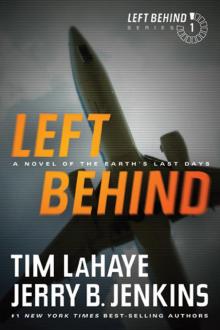 Left Behind
Left Behind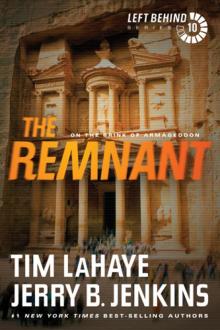 The Remnant
The Remnant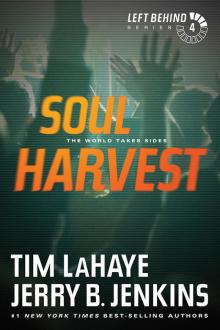 Soul Harvest
Soul Harvest Left Behind Book 13: Kingdom Come The Final Victory
Left Behind Book 13: Kingdom Come The Final Victory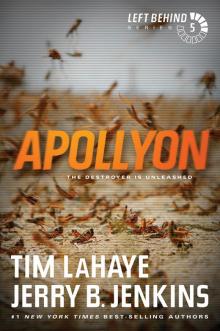 Apollyon
Apollyon 02 Thunder of Heaven: A Joshua Jordan Novel
02 Thunder of Heaven: A Joshua Jordan Novel Glorious Appearing
Glorious Appearing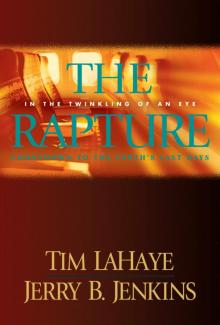 The Rapture: Evil Advances / Before They Were Left Behind
The Rapture: Evil Advances / Before They Were Left Behind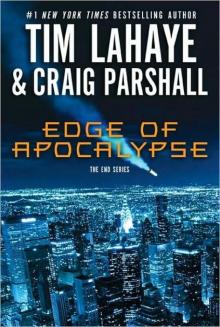 Edge of Apocalypse
Edge of Apocalypse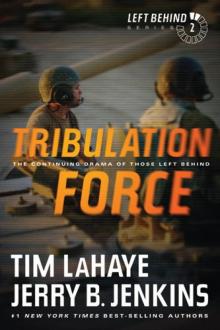 Tribulation Force
Tribulation Force The Left Behind Collection: All 12 Books
The Left Behind Collection: All 12 Books Black Friday
Black Friday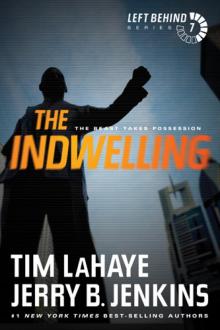 The Indwelling
The Indwelling The Left Behind Collection
The Left Behind Collection